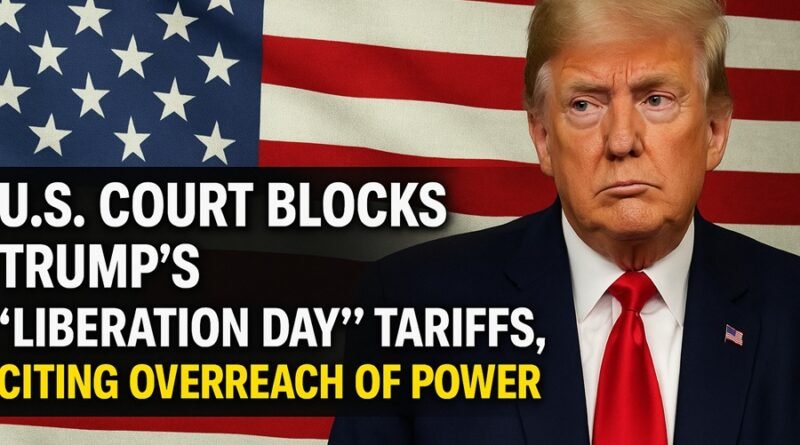U.S. Court Blocks Trump’s “Liberation Day” Tariffs: A Landmark Ruling on Presidential Overreach
In a powerful judicial check on executive authority, the U.S. Court of International Trade has struck down former President Donald Trump’s sweeping “Liberation Day” tariffs, declaring them unconstitutional and beyond the scope of presidential power. The decision, handed down on May 28, 2025, marks a pivotal moment in the ongoing debate over the limits of presidential authority in economic policy, especially in matters of international trade.
This case could reshape how future administrations approach trade policy and reinforces the principle that tariff imposition must be rooted in legal precedent and legislative approval—not unilateral executive action.
The Origin of the “Liberation Day” Tariffs
On April 2, 2025, Donald Trump—once again a leading political figure and potential 2024 Republican nominee—unveiled a sweeping tariff initiative dubbed “Liberation Day.” The plan was intended to mark what he described as an “economic emancipation” from foreign dependence, especially on manufacturing-heavy nations like China, Germany, and Mexico.
Under this policy, a blanket 10% tariff was imposed on nearly all imported goods. Countries deemed to have “unfair trade practices” or significant trade surpluses with the U.S. were slapped with even higher, punitive duties—in some cases, exceeding 30%.
Trump invoked the International Emergency Economic Powers Act (IEEPA) as the legal basis for the move, claiming that chronic trade deficits and intellectual property theft posed a national emergency that warranted immediate executive intervention.
Legal Challenge and Constitutional Questions
The tariffs were met with swift legal backlash. A coalition of small business owners, industry groups, and 12 state governments challenged the executive order in court, arguing that:
- The IEEPA was being misused, as it was designed for genuine national emergencies (such as terrorism or cyberattacks), not trade disagreements.
- The Constitution reserves the power to regulate trade with Congress, and Trump’s action amounted to bypassing legislative oversight.
- No formal national emergency was declared, nor was there a specific threat that justified the use of emergency economic powers.
The plaintiffs asserted that such sweeping economic changes required Congressional authorization, not just a unilateral declaration from the White House.
The Court’s Verdict: Presidential Overreach
In a scathing and unanimous opinion, the U.S. Court of International Trade ruled that the tariffs violated the constitutional separation of powers.
“The IEEPA was not intended to be a blanket authorization for trade policy by decree,” the court stated. “Imposing peacetime tariffs under the guise of an economic emergency undermines the legal framework and checks that protect our democracy.”
The court emphasized that long-term trade imbalances do not constitute the kind of “unusual and extraordinary threat” that the IEEPA was designed to address. It further concluded that the tariffs lacked congressional support, thus violating Article I, Section 8 of the U.S. Constitution, which assigns tariff and taxation powers explicitly to Congress.
The decision permanently blocks the implementation of the “Liberation Day” tariffs and mandates the lifting of any duties already imposed under the executive order.
Economic and Market Response
The financial markets reacted swiftly and positively to the ruling. U.S. stock indices soared in after-hours trading:
- Dow Jones Industrial Average futures jumped over 550 points.
- S&P 500 and Nasdaq-100 futures rose by 1.7% and 1.9% respectively.
- The U.S. dollar strengthened slightly against major currencies, signaling increased investor confidence.
Many economists welcomed the ruling, arguing that the tariffs would have worsened inflation and disrupted global supply chains.
Domestic importers and retailers, who had warned that the tariffs would raise prices on everything from electronics to groceries, expressed relief. Industry coalitions representing farmers, automakers, and tech firms praised the court for protecting “economic rationality and constitutional order.”
International Reactions
Global response was equally significant. The European Union, China, and Mexico had previously condemned the tariffs as illegal under World Trade Organization (WTO) rules. European leaders, in particular, warned of retaliatory measures that would have triggered a new trade war.
EU Trade Commissioner Marie Dumas welcomed the court’s decision, stating:
“Today’s verdict restores sanity to U.S. trade policy. Arbitrary tariffs undermine global economic cooperation.”
Beijing also signaled a diplomatic victory, hoping that the decision would ease tensions and foster a more rules-based trade relationship with Washington.
Political Implications for Trump and Future Presidents
For Donald Trump, this legal defeat is a major blow to his economic campaign platform. The “Liberation Day” tariffs were a cornerstone of his promise to “restore American industry.” Now, with the court’s ruling, he faces criticism not only for economic recklessness but for constitutional overreach.
It also raises deeper questions for future presidents: How much authority should the executive branch hold in setting economic policy? If courts continue to narrow the use of emergency powers, future administrations—regardless of party—will need to rely more on bipartisan cooperation in Congress to pass meaningful economic reforms.
Conclusion: A Landmark Legal and Economic Decision
The U.S. Court’s decision to block the “Liberation Day” tariffs represents more than just a policy reversal; it’s a defining moment in American legal and economic history. It reinforces the notion that executive power has limits—even in times of perceived urgency—and that Congress must remain the primary architect of trade policy.
This ruling safeguards not just business interests but the foundational principles of constitutional governance. As America continues to navigate complex global trade relationships, it will do so with a renewed emphasis on legal oversight, economic stability, and democratic accountability.

